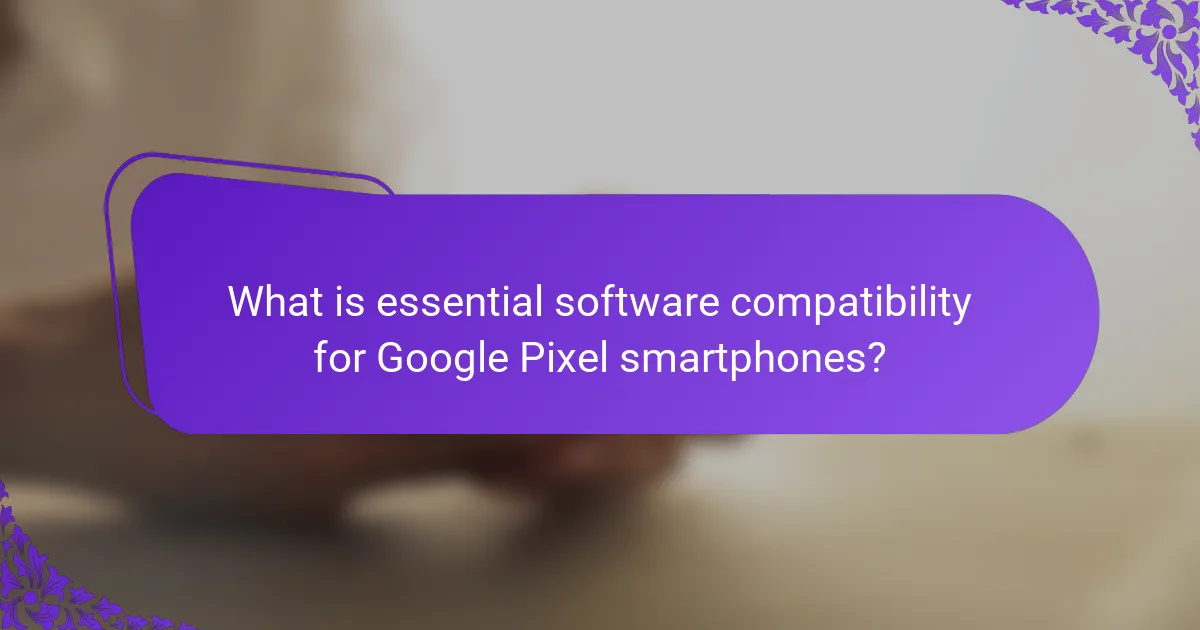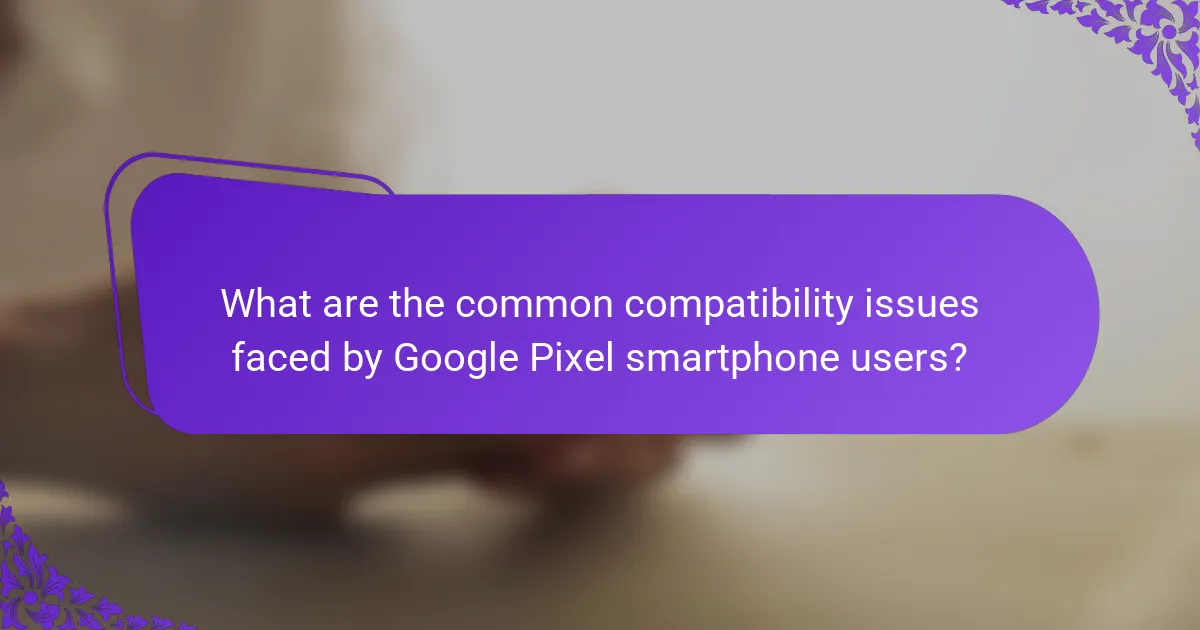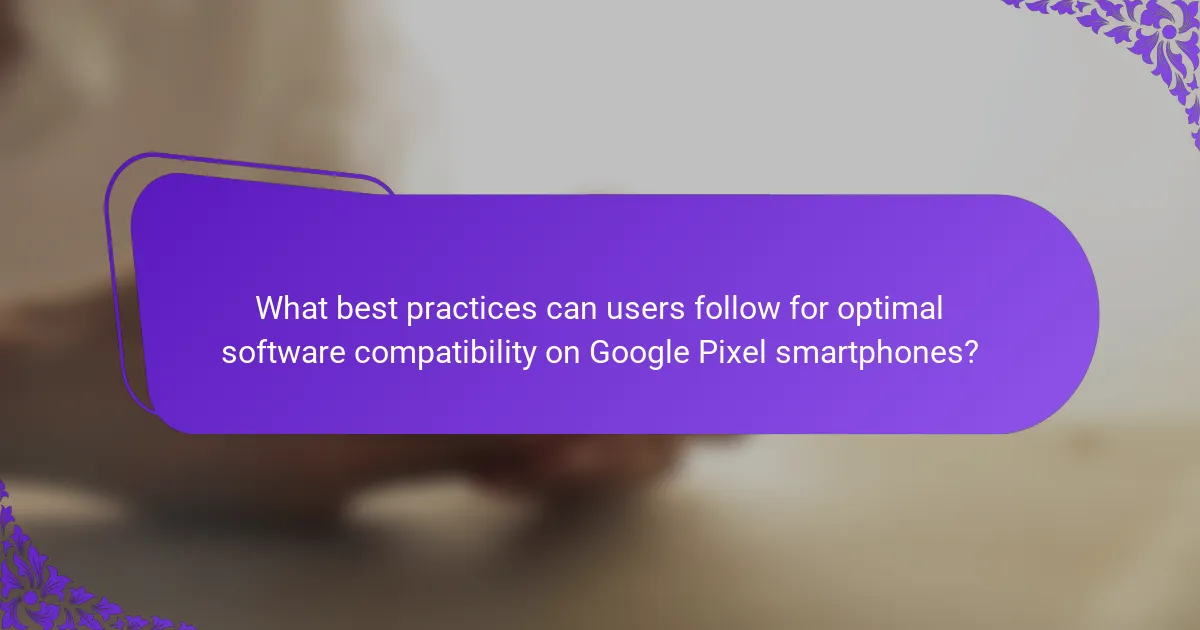Google Pixel smartphones are designed for optimal software compatibility, primarily supporting the latest Android operating systems, Google apps, and a wide range of third-party applications. These devices ensure seamless integration with essential Google services, including Google Assistant, Google Photos, and Google Drive, while regular software updates enhance functionality and security. However, users may encounter compatibility issues with certain apps and accessories, which can lead to performance problems or connectivity challenges. To maintain optimal software compatibility, users are encouraged to regularly update their devices, install apps from the Google Play Store, manage app permissions, and periodically restart their smartphones. Implementing these best practices can significantly improve the overall user experience on Google Pixel devices.

What is essential software compatibility for Google Pixel smartphones?
Essential software compatibility for Google Pixel smartphones includes support for Android operating systems, Google apps, and third-party applications. Google Pixel devices typically run the latest version of Android, ensuring optimal performance and security. They are designed to work seamlessly with Google services like Google Assistant, Google Photos, and Google Drive. Additionally, compatibility with popular apps from the Google Play Store is guaranteed. Regular software updates enhance functionality and fix security vulnerabilities. This compatibility ensures a smooth user experience, aligning with Google’s ecosystem.
Why is software compatibility important for Google Pixel smartphones?
Software compatibility is crucial for Google Pixel smartphones to ensure optimal performance and user experience. It allows users to access the latest apps, features, and security updates. Compatibility with software enhances device functionality and usability. Google Pixel smartphones receive timely Android updates directly from Google. This ensures that users benefit from the latest improvements and security patches. Additionally, software compatibility supports seamless integration with Google services and applications. This integration enhances overall device performance and user satisfaction. In essence, software compatibility is vital for maintaining the efficiency and security of Google Pixel smartphones.
How does software compatibility affect user experience on Google Pixel smartphones?
Software compatibility significantly influences user experience on Google Pixel smartphones. Compatible software ensures smooth performance and access to the latest features. Incompatible software can lead to crashes, slowdowns, or limited functionality. Google Pixel devices receive regular updates, enhancing compatibility with new apps and services. This regularity improves security and user satisfaction. For instance, Pixel smartphones often receive Android updates first, ensuring optimal app performance. Additionally, compatibility with Google services enhances integration and usability. Overall, software compatibility is crucial for maximizing the potential of Google Pixel smartphones.
What are the risks of using incompatible software on Google Pixel smartphones?
Using incompatible software on Google Pixel smartphones can lead to various risks. These risks include system instability, which may cause frequent crashes or errors. Performance issues can arise, resulting in slower operation or unresponsive applications. Security vulnerabilities are also a significant concern, as incompatible software may not receive necessary updates. This can expose the device to malware or data breaches. Additionally, features may not function correctly, limiting the smartphone’s capabilities. Compatibility problems can also lead to loss of data or corrupted files. Users may experience difficulties in accessing customer support for issues related to incompatible software. Overall, these risks can significantly impact the user experience and device reliability.
What types of software are compatible with Google Pixel smartphones?
Google Pixel smartphones are compatible with various types of software. This includes the Android operating system, which is the primary software platform. Google Pixel devices run on stock Android, providing a clean user interface and timely updates.
Additionally, Pixel smartphones support a wide range of applications available on the Google Play Store. This encompasses productivity apps, social media platforms, and entertainment software.
Moreover, Google Pixel smartphones are compatible with various Google services, such as Google Photos, Google Drive, and Google Assistant. These services enhance the functionality of the device and improve user experience.
In summary, Google Pixel smartphones support the Android OS, numerous apps from the Google Play Store, and various Google services.
What operating systems are supported by Google Pixel smartphones?
Google Pixel smartphones support the Android operating system. Each Pixel model runs a specific version of Android, starting from Android 7.1 Nougat to the latest version available at the time of release. Google provides regular software updates for Pixel devices, ensuring they receive the latest Android features and security patches. Additionally, Pixel smartphones are compatible with Android One and Android Go for certain models. This compatibility enhances the user experience by providing a clean and optimized interface.
Which applications are optimized for Google Pixel smartphones?
Google Pixel smartphones are optimized for applications like Google Photos, Google Assistant, and Google Camera. These applications leverage the hardware and software integration of Pixel devices. Google Photos offers advanced photo editing features exclusive to Pixel users. Google Assistant is deeply integrated for voice commands and smart home control. Google Camera provides superior image processing capabilities. Other optimized apps include YouTube, which benefits from enhanced display features, and Google Maps, which utilizes real-time location tracking. These optimizations enhance user experience and performance on Google Pixel smartphones.
How can users check software compatibility on their Google Pixel smartphones?
Users can check software compatibility on their Google Pixel smartphones by accessing the device’s settings. First, open the “Settings” app on the Pixel smartphone. Then, scroll down and select “System.” From there, tap on “Advanced,” followed by “System update.” This section will display the current software version and indicate if the device is up to date. Users can also visit the Google Play Store to check app compatibility. The Play Store lists compatible apps based on the device’s software version. Additionally, users can refer to the official Google website for compatibility information specific to their Pixel model. This ensures they have the latest updates and compatible applications.
What steps should users take to verify app compatibility?
Users should check the app’s compatibility with Google Pixel smartphones before installation. First, review the app’s listing in the Google Play Store. The listing usually indicates supported devices and operating system versions. Next, verify the Android version on your Pixel smartphone. This can be found in the settings under ‘About Phone.’ Ensure that the app’s requirements align with your device’s specifications. Additionally, read user reviews for feedback on compatibility issues. Finally, check for any updates to the app or your device’s operating system. Keeping both the app and the device updated enhances compatibility.
How can users ensure their device’s operating system is up to date?
Users can ensure their device’s operating system is up to date by regularly checking for updates in the settings menu. On Google Pixel smartphones, users should navigate to Settings, then tap on System, followed by System update. This section will indicate if updates are available. Users can also enable automatic updates to receive the latest operating system versions automatically. Google Pixel devices typically receive updates for at least three years from the release date. Regular updates enhance security and improve device performance.

What are the common compatibility issues faced by Google Pixel smartphone users?
Google Pixel smartphone users often face compatibility issues with certain apps and accessories. Some apps may not be optimized for the latest Android versions. This can lead to crashes or performance problems. Additionally, third-party accessories may not work properly. For example, some Bluetooth devices have connectivity issues. Certain features may also be unavailable due to hardware limitations. Users may experience challenges with software updates. These updates can sometimes cause existing apps to malfunction. Overall, compatibility issues can hinder the user experience on Google Pixel smartphones.
What specific software issues do users encounter?
Users encounter various software issues with Google Pixel smartphones. Common problems include system crashes and app freezes. Users often report battery drain due to software bugs. Compatibility issues with third-party applications are also prevalent. Some users experience slow performance after software updates. Connectivity problems with Wi-Fi and Bluetooth frequently arise. Users may face difficulty with software installation and updates. Additionally, security vulnerabilities can affect user data. These issues can significantly impact the overall user experience on Google Pixel smartphones.
How can users troubleshoot app crashes on Google Pixel smartphones?
To troubleshoot app crashes on Google Pixel smartphones, users should first restart their device. A simple reboot can resolve temporary software issues. Next, users should check for app updates in the Google Play Store. Updated apps often fix bugs that cause crashes. Clearing the app cache can also help. Users can do this by going to Settings, selecting Apps, then choosing the specific app and tapping on Clear Cache. If the problem persists, uninstalling and reinstalling the app may be necessary. This process ensures that any corrupted files are removed. Additionally, users should ensure their device software is up to date. They can check for updates in Settings under System and then System Update. Finally, if crashes continue, users may consider performing a factory reset as a last resort. This action restores the device to its original settings, eliminating persistent issues.
What are the common problems with system updates on Google Pixel smartphones?
Common problems with system updates on Google Pixel smartphones include issues like battery drain, performance slowdowns, and connectivity problems. Users often report that their device experiences decreased battery life post-update. Performance slowdowns can manifest as lag or unresponsive apps. Connectivity problems may affect Wi-Fi, Bluetooth, or cellular networks after an update. Some users also encounter bugs that lead to crashes or app failures. Additionally, there can be compatibility issues with third-party applications. These problems are frequently discussed in user forums and tech reviews, highlighting their impact on user experience.
How do third-party applications impact software compatibility?
Third-party applications can significantly impact software compatibility by introducing conflicts or dependencies that the primary software may not support. These applications often require specific system resources or APIs that may differ from the original software’s capabilities. For instance, if a third-party app demands a higher version of an operating system, it may render the software incompatible with older versions. Additionally, third-party applications can lead to performance issues, such as increased memory usage or crashes, affecting overall system stability. Studies have shown that approximately 30% of compatibility issues in smartphone software stem from third-party applications. This statistic highlights the importance of ensuring that third-party applications are optimized for the specific software environment.
What should users consider before installing third-party applications?
Users should consider the security and legitimacy of third-party applications before installation. Third-party apps may not undergo the same scrutiny as official apps. This increases the risk of malware and data breaches. Users should verify the source of the application. Downloading from reputable websites or app stores is crucial. They should also check user reviews and ratings. High ratings and positive feedback often indicate reliability. Additionally, users should be aware of the permissions requested by the app. Excessive permissions can signal potential misuse of data. Finally, compatibility with Google Pixel smartphones should be confirmed to ensure optimal performance.
How can third-party apps enhance or hinder performance on Google Pixel smartphones?
Third-party apps can enhance or hinder performance on Google Pixel smartphones in various ways. Enhanced performance occurs when these apps optimize device functionality. For example, productivity apps can streamline tasks and improve user efficiency. High-quality games can leverage the hardware capabilities, providing better graphics and smoother gameplay.
Conversely, third-party apps can hinder performance by consuming excessive system resources. Some apps may run background processes that drain battery life and slow down the device. Poorly designed apps can lead to crashes or system instability. According to research by Google, poorly optimized apps can increase load times and decrease overall responsiveness.
In summary, third-party apps can significantly impact Google Pixel performance, either positively or negatively, depending on their design and resource usage.

What best practices can users follow for optimal software compatibility on Google Pixel smartphones?
Users can follow several best practices for optimal software compatibility on Google Pixel smartphones. Regularly updating the smartphone’s operating system is crucial. Google frequently releases updates that enhance compatibility and security. Installing apps from the Google Play Store ensures they are optimized for Pixel devices. Users should also check app permissions to avoid conflicts. Clearing app caches can resolve compatibility issues. Restarting the device periodically can improve performance. Lastly, users should review and manage installed apps to eliminate any that may cause conflicts. These practices help maintain smooth operation and compatibility with software updates.
What tips can help users maintain software compatibility?
To maintain software compatibility, users should regularly update their Google Pixel smartphones. Software updates often include compatibility fixes and improvements. Users should also check app compatibility with the latest operating system version. This ensures that all applications function correctly. Additionally, users should avoid installing apps from unverified sources. This practice reduces the risk of incompatibility and security issues. Regularly clearing cache and data for apps can also help. It resolves potential conflicts and improves performance. Lastly, users should back up their data before major updates. This precaution protects against data loss during compatibility adjustments.
How often should users update their applications for best performance?
Users should update their applications at least once a month for optimal performance. Regular updates enhance security, fix bugs, and improve functionality. Research shows that outdated applications can lead to slower performance and increased vulnerabilities. For instance, a study by the Ponemon Institute indicates that 60% of data breaches involve unpatched vulnerabilities. Therefore, consistent application updates are crucial for maintaining device efficiency and security.
What resources are available for users to stay informed about compatibility issues?
Users can stay informed about compatibility issues through several resources. Official Google support pages provide detailed information on software updates and compatibility. Online forums, such as Reddit and XDA Developers, offer community-driven insights and user experiences. Tech news websites frequently report on compatibility updates and issues. Manufacturer websites often list compatible apps and software versions. Social media channels of Google share real-time updates regarding compatibility. Additionally, user reviews on app stores can highlight compatibility problems. These resources collectively ensure users remain informed about compatibility issues related to Google Pixel smartphones.
What are the common troubleshooting steps for software compatibility issues on Google Pixel smartphones?
To troubleshoot software compatibility issues on Google Pixel smartphones, users should first check for software updates. This can be done by navigating to Settings, then System, and selecting System update. Ensuring that the device is running the latest software version can resolve many compatibility problems.
Next, users should verify app compatibility. They can check the Google Play Store for app updates. Updating apps can fix bugs and improve compatibility with the current software version.
Clearing the app cache is another effective step. Users can do this by going to Settings, selecting Apps, choosing the specific app, and tapping on Storage, then Clear Cache. This can resolve minor issues without deleting app data.
If problems persist, users should consider uninstalling and reinstalling the problematic app. This can help reset the app and resolve any lingering issues.
Additionally, performing a factory reset can be a last resort. This action restores the device to its original settings, which can eliminate software conflicts. However, users should back up their data before proceeding with this step.
Lastly, consulting Google Support or community forums can provide specific solutions for unique compatibility issues. These resources often contain valuable insights from other users facing similar problems.
How can users reset their devices to resolve compatibility problems?
Users can reset their devices to resolve compatibility problems by performing a factory reset. This process restores the device to its original settings. To initiate a factory reset, go to the Settings app on the device. Next, select ‘System’ and then ‘Reset options.’ Choose ‘Erase all data (factory reset).’ Confirm the action and wait for the device to reset. This method is effective because it eliminates software conflicts and returns the device to a clean state. It is advisable to back up important data before proceeding, as this action will erase all personal information.
What should users do if they encounter persistent software compatibility issues?
Users should first check for software updates on their Google Pixel smartphones. Regular updates often fix compatibility issues. Next, they should review the app’s requirements in the Google Play Store. This ensures the app is compatible with their device. If problems persist, users can clear the app’s cache and data. This action can resolve many common issues. Additionally, users may consider uninstalling and reinstalling the problematic app. This can refresh the app’s installation and settings. If the issue continues, contacting the app developer for support is advisable. Developers may provide specific solutions or updates.
Essential software compatibility for Google Pixel smartphones encompasses support for the Android operating system, Google apps, and third-party applications, ensuring optimal performance and user experience. This article outlines the significance of software compatibility, the types of compatible software, and the risks associated with using incompatible applications. It also addresses common compatibility issues, troubleshooting steps, and best practices for maintaining software compatibility, providing users with essential knowledge to enhance their device’s functionality and security.